Crossref Citations
This article has been cited by the following publications. This list is generated based on data provided by Crossref.
Buerger, Catherine
2018.
An introduction to JHR’s new Methods Focus series.
Journal of Human Rights,
Vol. 17,
Issue. 3,
p.
380.





